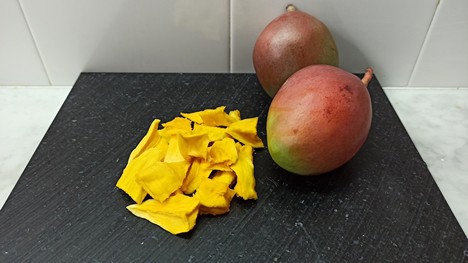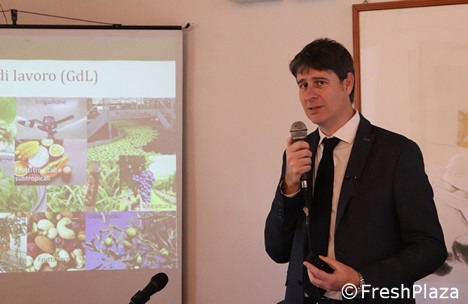Quite apart from climate change, which is reflected not so much in the increase in temperature as in the intensification of sudden and violent weather events alternating with periods of intense heat and drought, tropical fruits have been around in Sicily since 1957, the year when Francesco Calabrese, professor of Tropical and Subtropical Fruit Growing at the University of Palermo, introduced the first avocado plants.
That was the year that Prof. Francesco Calabrese, Professor of Tropical and Subtropical Fruit Growing at the University of Palermo, introduced the first avocado plants from California, although intensive cultivation would arrive many years later, along with the production of lychee, papaya, passion fruit, finger lime and others, including mango.
 Dehydrated and fresh mangoes
Dehydrated and fresh mangoes
The requirement for growing tropical fruits, or rather fruits that are adapted to a sub-tropical-Mediterranean climate such as Sicily, is that winter temperatures are mild, so that the plant can survive, grow and produce fruits.
One of the most valuable tropical fruits today is the mango, which is seeing a growing trend in consumption and increasing interest from the Italian and European agri-food industry. The large-scale retail trade's preference for a product with phytosanitary standards and with a low carbon footprint, like the Sicilian mango as opposed to the overseas product, has allowed this crop to intensify in recent years.
One of the limitations of the mango at the time of sale is the presence of aesthetic defects due to abiotic problems, such as sunburn and manipulation during and after harvesting. This lowers the value of the fruit and risks turning it into waste, with the consequent loss of income for the producer. Based on this context, a group of scientists, made up of Ilenia Tinebra, Dario Scuderi, Roberta Passafiume and Francesca Mancuso from the Department of Agricultural, Food and Forestry Sciences (SAAF) - University of Palermo, and led by Prof. Vittorio Farina, has developed a method to dehydrate mangoes with the aim of extending their shelf life and preserving their commercial value.
 Prof. Vittorio Farina
Prof. Vittorio Farina
"The dehydrated fruit market plays an important economic role in different parts of the world, with growing consumption trends at a worldwide scale in European countries, both as a product as is, and in combination with dried fruit or in bars and snacks. Dehydration is an important process in the management of post-harvest fruit, since it has a high water content, in most cases more than 80%; this method is an alternative technique to significantly increase the shelf-life of the product, making it available in periods when it is not seasonally available. Reducing the water content also slows down metabolic reactions and the proliferation of microorganisms,” said Prof. Vittorio Farina.
"The modern consumer demands healthy food with high nutraceutical properties. Based on this consideration, we wanted to create a new product, a dehydrated Sicilian mango. We started from early-ripened fruits, but also from those that were ripe and ready for consumption or from those with aesthetic defects, which are not in line with the fresh market needs. In this way, we achieved the additional goal of not wasting food. We have obtained a product with color, aroma and taste that reminds us of a fresh Sicilian mango, eliminating its typical perishability,” explained the professor.
“This is an idea that could be turned into snacks or as an ingredient in various recipes. Dehydrated fruits retain their high nutritional value, appearance, smell and very pleasant taste. The experimentation was carried out as part of the Postmango Project, in collaboration with the producers' organization OP Uno Sicilia of Bagheria, which is also active in the province of Messina's Tyrrhenian coast, where some companies that took part in the activities such as Roccacoop, located in Rocca di Capri Leone, are located,” concluded Prof. Vittorio Farina.
For more information:
Prof. Vittorio Farina
Dipartimento Scienze Agrarie, Alimentari e Forestali (SAAF)
Università degli Studi di Palermo
vittorio.farina@unipa.it
